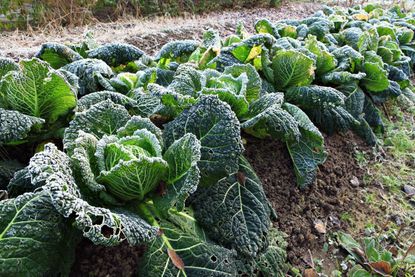Zone 8 Winter Veggie Garden: Growing Winter Vegetables In Zone 8


United States Department of Agriculture zone 8 is one of the warmer regions of the country. As such, gardeners can easily enjoy the fruit of their labor simply because the summer growing season is long enough to do so. How about cold season vegetables for zone 8? Can you grow vegetables in zone 8 winters? If so, what winter vegetables are suited to grow in zone 8?
Can You Grow Vegetables in Zone 8?
Absolutely! You do, however, want to consider a couple of factors before choosing winter vegetables in zone 8. The most important thing to consider is your microclimate. Zone 8 is actually divided into two sections – 8a and 8b. In zone 8a, temperatures will dip as low as 10 to 15 degrees F. (-9 to -12 C.), and in zone 8b it can drop to 15 to 20 degrees F. (-7 to -12 C.). If you live near the ocean, for example, your microclimate is likely to be more temperate. Topography from roofs or hilltops will affect your climate and make it warmer, as will areas that are protected from winds or are near heat absorbing buildings. Conversely, locations in valleys tend to be colder than average. The approximate last freeze date for zone 8 is March 15th and November 15th for the first freeze date in the fall. That said, there are no hard and fast rules; these are just annual averages. Some crops can be damaged during a light freeze and others are hardier and can withstand the cold temperatures. An excellent resource would be your local university’s extension office. They will be able to guide you regarding cold season vegetables for your particular region of zone 8.
Why Grow a Winter Garden in Zone 8?
For certain areas, planting a winter garden in zone 8 may be the best time to get cool crops like broccoli, carrots, and spinach to grow well. For many zone 8 gardeners, the impending fall months mean rain. This means less work on your part with no need to water. October is an excellent time to start a zone 8 winter veggie garden. The soil is still warm, but the intensity of the sun has waned. There are fewer insects and diseases that are likely to attack your crops. The cooler weather allows seedlings and transplants to ease into maturing. Along with the possibility of more rain, soil holds moisture in longer in the fall. Weeds grow slower and the temperature is more comfortable to work in. Also, there’s not the rush to harvest that occurs in summer heat since the plants will hold in the garden longer in the cooler temps.
Cold Season Vegetables for Zone 8
Prep the garden by turning the soil, weeding, and amending the area with compost. While the aforementioned rains mean less watering in some areas, such as the Pacific Northwest, constant rain means rotting plants, so consider growing in a raised bed. So, what crops should you consider planting in a winter garden? All the cool season veggies are good choices, such as:
Tender greens are good too, like:
These cool weather crops can be planted in winter and early spring for late spring harvest and early summer harvest respectfully, and in late August and September for harvesting during the winter. Be sure to add an organic fertilizer at or just after planting time. The mild temperatures of zone 8 allows seeds to be planted early in the season and cool weather crops can tolerate light frosts, especially if you use a cold frame or other protective covering. Plus, a winter garden in zone 8 often produces crops with better flavor, size, and texture than if they were grown in the heat of summer. Just don’t be expecting to grow tomatoes, eggplant, or peppers, but there are still plenty of cool weather crop options to choose from.
Gardening tips, videos, info and more delivered right to your inbox!
Sign up for the Gardening Know How newsletter today and receive a free download of our most popular eBook "How to Grow Delicious Tomatoes."

Amy Grant has been gardening for 30 years and writing for 15. A professional chef and caterer, Amy's area of expertise is culinary gardening.